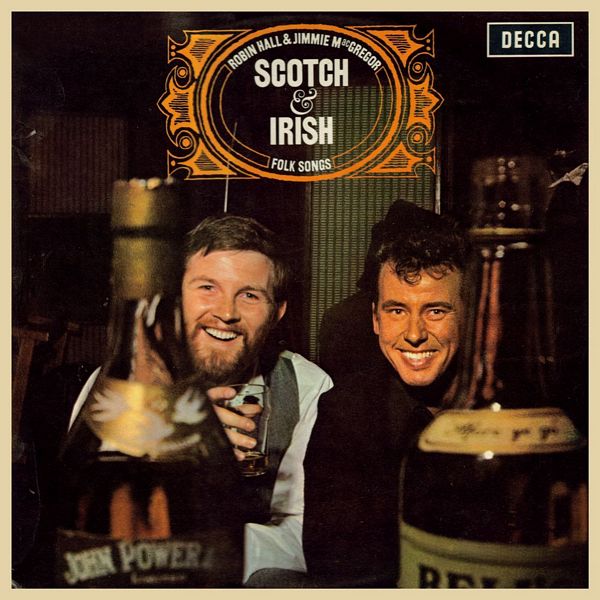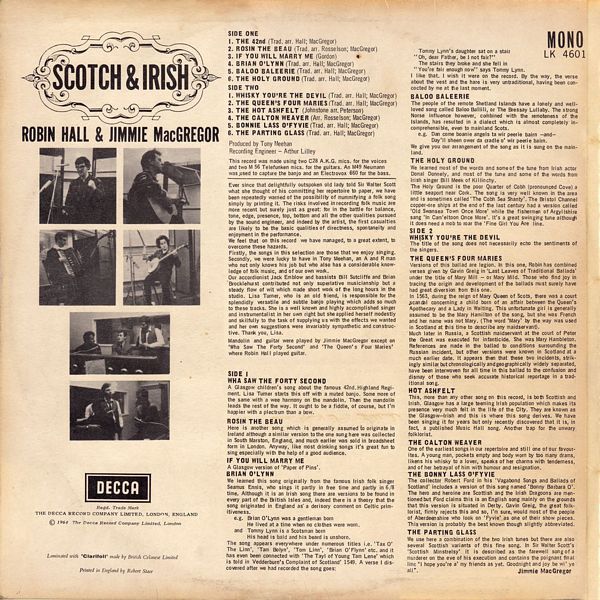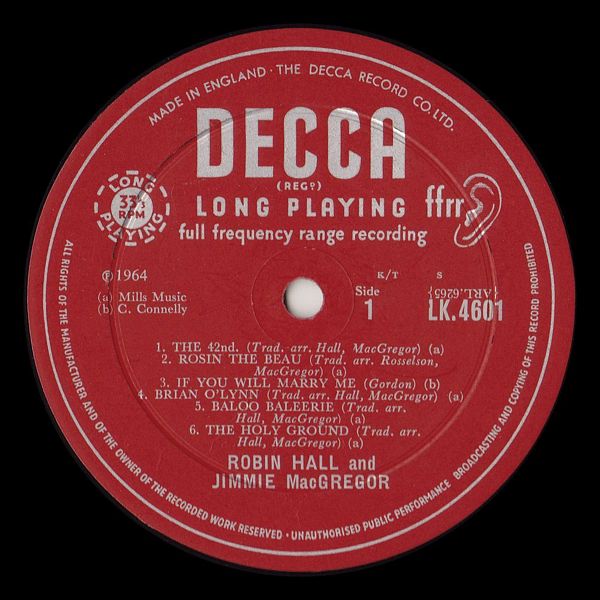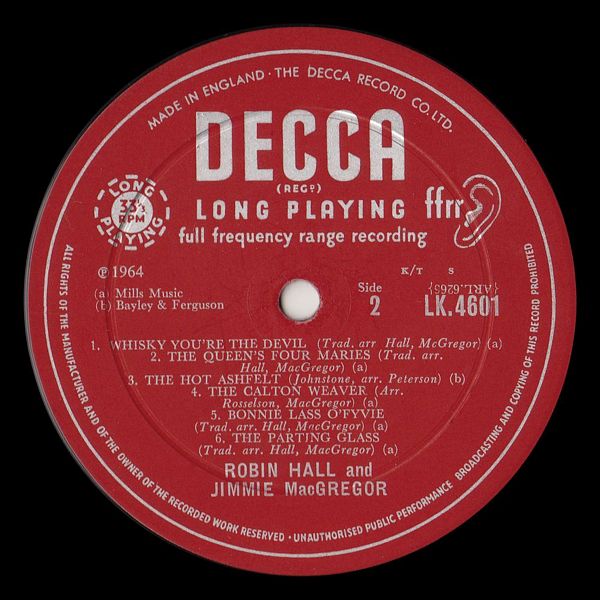

 |


 |
Sleeve Notes
Ever since that delightfully outspoken old lady told Sir Walter Scott what she thought of his committing her repertoire to paper, we have been repeatedly warned of the possibility of mummifying a folk song simply by printing it. The risks involved in recording folk music are more recent but surely just as great: for in the battle for balance, tone, edge, presence, top, bottom and all the other qualities pursued by the sound engineer, and indeed by the artist, the first casualties are likely to be the basic qualities of directness, spontaneity and enjoyment in the performance.
We feel that on this record we have managed, to a great extent, to overcome these hazards.
Firstly, the songs in this selection are those that we enjoy singing. Secondly, we were lucky to have in Tony Meehan, an A and R man who not only knows his job but who also has a considerable knowledge of folk music, and of our own work.
Our accordionist Jack Emblow and bassists Bill Sutcliffe and Brian Brocklehurst contributed not only superlative musicianship but a steady flow of wit which made short work of the long hours in the studio. Lisa Turner, who is an old friend, is responsible for the splendidly versatile and subtle banjo playing which adds so much to these tracks. She is a well known and highly accomplished singer and instrumentalist in her own right but she applied herself modestly and skillfully to the task of supplying us with the effects we wanted and her own suggestions were invariably sympathetic and constructive. Thank you. Lisa.
Mandolin and guitar were played by Jimmie MacGregor except on 'Wha Saw the Forty Second' and 'The Queen's Four Maries' where Robin Hall played guitar.
WHA SAW THE FORTY SECOND
A Glasgow children's song about the famous 42 nd Highland Regiment. Lisa Turner starts this off with a muted banjo. Some more of the same with a wee harmony on the mandolin. Then the mandolin leads the rest of the way. It ought to be a fiddle, of course, but I'm happier with a plectrum than a bow.
ROSIN THE BEAU
Here is another song which is generally assumed to originate in Ireland although a similar version to the one sung here was collected in South Marston, England, and much earlier was sold in broadsheet form in London. Anyway, like most drinking songs it's great fun to sing especially with the help of a good audience.
IF YOU WILL MARRY ME
A Glasgow version of "Paper of Pins".
BRIAN O'LYNN
We learned this song originally from the famous Irish folk singer Seamus Ennis, who sings it partly in free time and partly in 6/8 time. Although it is an Irish song there are versions to be found in every part of the British Isles and, indeed there is a theory that the song originated in England as' a derisory comment on Celtic primitive ness.
e.g. Brian O'Lynn was a gentleman born
He lived at a time when no clothes were worn.
and Tommy Lynn is a Scotsman born
His head is bald and his beard is unshorn.
The song appears everywhere under numerous titles i.e. "Tax O' The Linn", "Tarn Bolyn", "Tom Linn", "Brian O'Flynn" etc., and it has even been connected with "The Tayl of Young Tam Lene" which is told in Vedderburn's CompIaint of Scotland' 1549. A verse I discovered after we had recorded the song goes:
Tommy Lynn's daughter sat on a stair
Oh, dear Father, be I not fair?"
The stairs fliey broke and she fll in
"You're fair enough now" says Tommy Lynn.
I like that. I wish it were on the record. By the way, the verse about the vest and the hare is very untraditional, having been concocted by me at the last moment.
BALOO BALEERIE
The people of the remote Shetland Islands have a lonely and well-loved song called Baloo Ballili, or The Bressay Lullaby. The strong Norse influence however, combined with the remoteness of the Islands, has resulted in a dialect which is almost completely incomprehensible, even to mainland Scots.
e.g. Dan come boanie angels ta wir peerie bairn -and- Day!
sheen ower da cradle o' wir peerie bairn.
We give you our arrangement of the song as it is sung on the mainland.
THE HOLY GROUND
We learned most of the words and some of the tune from Irish actor Donal Donnely, and most of the tune and some of the words from Irish singer Bill Meek of Killinchy.
The Holy Ground is the poor Quarter of Cobh (pronounced Cove) a little seaport near Cork. The song is very well known in the area and is sometimes called "The Cobh Sea Shanty". The Bristol Channel copper-ore ships at the end of the last century had a version called "Old Swansea Town Once More" while the fishermen of Argyllshire sang "In Cam'eltoon Once More". It's a great swinging tune although it does need a mob to roar the "Fine Girl You Are" line.
WHISKY YOU'RE THE DEVIL
The title of the song does not necessarily echo the sentiments of the singers.
THE QUEEN'S FOUR MARIES
Versions of this ballad are legion. In this one, Robin has combined verses given by Gavin Greig in Last Leaves of Traditional Ballads under the title of "Mary Mill" - or "Mary Mild". Those who find joy in tracing the origin and development of the ballads must surely have had great diversion from this one.
In 1563, during the reign of Mary Queen of Scots, there was a court scandal concerning a child born of an affair between the Queen's Apothecary and a Lady in Waiting. This unfortunate girl is generally assumed to be the Mary Hamilton of the song, but she was French and her name was not Mary. (The word "Mary" by the way was used in Scotland at this time to describe any maidservant). Much later in Russia, a Scottish maidservant at the court of Peter the Great was executed for infanticide. She was Mary Hambleton. References are made in the ballad to conditions surrounding the Russian incident, but other versions were known in Scotland at a much earlier date. It appears then that these two incidents, strikingly similar but chronologically andgeographically widely separated, have been interwoven for all time in this ballad to the confusion and dismay of those who seek accurate historical reportage in a traditional song.
HOT ASHFELT
This, more than any other song on this record, is both Scottish and Irish. Glasgow has a large teeming Irish population which makes its presence very much felt in the life of the City. They are known as the Glasgow-Irish and this where this song derives. We have been singing it for years but only recently discovered that it is, in fact, a published Music Hall song. Another trap for the unwary folklorist.
THE CALTON WEAVER
One of the earliestsongsinour repertoire and still one of our favourites. A young man, pockets empty and body worn by too many drams, likens his whisky to a lover, speaks of her charms with tenderness, and of her betrayal of him with humour and resignation.
THE BONNY LASS O'FYVIE
The collector Robert Ford in his Vagabond Songs and Ballads of Scotland includes a version of this song named 'Bonny Barbara O'. The hero and heroine are Scottish and the Irish Dragoons are mentioned but Ford claims this an English song mainly on the grounds that this version is situated in Derby. Gavin Greig, the great folklorist, firmly rejects this and so, I'm sure, would most of the people of Aberdeenshire who look on 'Fyvie' as one of their show pieces. This version is probably the best known though slightly abbreviated.
THE PARTING GLASS
We use here a combination of the two Irish tunes but there are also several Scottish variants of this fine song. In Sir Walter Scott's "Scottish Minstrelsy" it is described as the farewell song of a murderer on the eve of his execution and contains the poignant final line "I hope you're a' my friends as yet. Goodnight and joy be wi' ye all".
Jimmie MacGregor